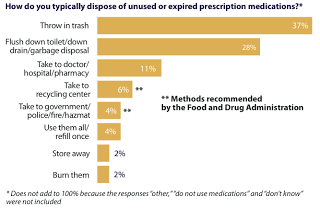2 out of 3 Kentuckians disposing of prescription drugs improperly, poll finds

By Tara Kaprowy
Kentucky Health News
The FDA recommends disposal through take-back programs, which offer locations for people to bring unused or expired drugs. The next National Drug Take Back Day will be April 28. On the last Take Back Day, 377,086 pounds of unwanted or expired drugs were turned in. Also, Kentucky has 76 drop boxes in 46 counties (yellow on map; counties with pending sites in blue) where people can dispose of drugs. To find a listing of these drop box locations, click here.
Kentucky Health News
At a summit on prescription drug abuse last week, Attorney General Jack Conway spoke of experiences he’s had talking to middle schoolers about prescription drugs. When he asks if they know someone who has tried drugs that haven’t been prescribed to them, 70 to 80 percent of hands go up. But when asked to keep their hands up if their parents keep their medicine cabinets locked, “all hands go down,” Conway said. “This is a problem that is starting in our homes,” he said. “It’s a culture we have to break.”
Not only are most medicine cabinets not locked, they are usually not cleaned out in the proper way, according to the latest Kentucky Health Issues Poll. Sixty-five percent of Kentucky adults dispose of prescription drugs by throwing them away (37 percent) or flushing them down the drain (28 percent). Only 6 percent take them to a recycling center and just 4 percent take them to a government or police facility where they can be safety discarded — though those are the two methods of disposal recommended by the Food and Drug Administration.
The drugs that are thrown in the garbage or flushed down the drain eventually reach the water supply, posing potential harm to people and wildlife. In a 2008 inquiry, The Associated Press found trace amounts of antibiotics, anti-convulsants, mood stabilizers and sex hormones in the drinking water of 24 major U.S. metropolitan areas, including Louisville. Though the concentrations were tiny, “the presence of so many prescription drugs — and over-the-counter medicines like acetaminophen and ibuprofen — in so much of our drinking water is heightening worries among scientists of long-term consequences of human health,” AP reported.
The Health Issues Poll found that nearly 50 percent of respondents aged 18-29 threw unused or expired prescriptions in the trash. That percentage steadily decreases as people get older, with just 23 percent of people 65 and older likewise trashing the drugs, though they were more likely to flush them down the drain (33 percent). Education levels do not seem to be a factor.
The FDA recommends disposal through take-back programs, which offer locations for people to bring unused or expired drugs. The next National Drug Take Back Day will be April 28. On the last Take Back Day, 377,086 pounds of unwanted or expired drugs were turned in. Also, Kentucky has 76 drop boxes in 46 counties (yellow on map; counties with pending sites in blue) where people can dispose of drugs. To find a listing of these drop box locations, click here.
The poll was funded by The Health Foundation of Greater Cincinnati and the Foundation for a Healthy Kentucky. It was conducted Sept. 27 to Oct. 27 by the Institute for Policy Research at the University of Cincinnati. A random sample of adults across Kentucky were interviewed, including 1,313 landline interviews and 308 cell-phone interviews. For more information about the findings, click here.

